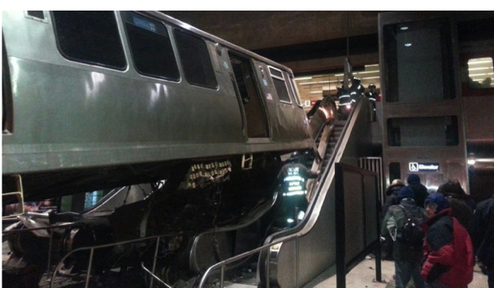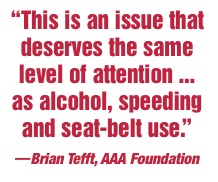
NTSB cites operator fatigue, lack of safety equipment in CTA crash at O'Hare
By Jon Hilkevitch
re-posted from Chicago Tribune
A CTA rail operator who fell asleep at the controls and crashed a Blue Line train into the O'Hare station last year did not report to work adequately rested as she juggled different starting times, and the transit agency failed to properly manage her schedule to reduce the risk of fatigue, an investigation by the National Transportation Safety Board concluded Tuesday.
NTSB cites operator fatigue in CTA crash at O'Hare
Citing those factors as the probable cause of the accident on March 24, 2014, the investigation also found that contributing factors included the CTA's failure to provide sufficient speed restrictions and stopping distances in the event of an emergency as a train entered the station.
"The layers of protection designed to prevent such an accident failed," safety board Chairman Christopher Hart said at the opening of an hourlong hearing in Washington. He cited both the train operator dozing off due to severe fatigue and the absence of safety equipment that would have stopped the train safely once the operator failed to obey a red signal.
The accident occurred shortly before 3 a.m. when the train overshot the stopping area at the O'Hare International Airport station, smashed through a bumping post at the end of the track and landed atop an escalator, which was unoccupied because of the hour.
The crash injured 33 passengers and caused roughly $9 million in damage.
The CTA fired the operator, Brittney Haywood, a one-year employee who completed training two months before the accident. Haywood, 25, told investigators she dozed off before the crash.
Only a month into the investigation, the safety board said the accident could have been prevented if a sensor that triggers the train's automatic braking system were properly positioned farther away from the end of the track.
The CTA subsequently implemented a series of changes at the O'Hare station and tightened work and rest rules.
The safety board on Tuesday also issued a series of safety recommendations aimed at preventing similar accidents on U.S. transit systems. They included advising the Federal Transit Administration to develop a work schedule program for public transit agencies that incorporates fatigue science and provides predictable work and rest schedules, as well as setting limits on rail operators' hours of service.
Tuesday's NTSB hearing wrapped up a 13-month investigation. In late March, the safety board released more than 1,600 pages of documents, including statements based on an interview with Haywood. She admitted that she also dozed off in February 2014 at the controls of her train at the Blue Line stop at Belmont.

 RSS Feed
RSS Feed